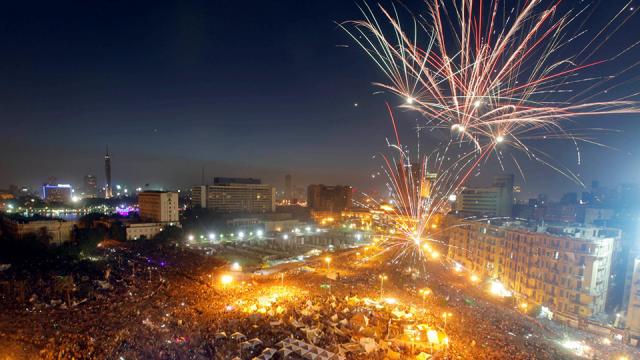CAIRO: Black, White and Red flags overran the scene all across Egypt on Wednesday evening as the country celebrated its “second revolution” with the ousting of embattled President Mohamed Morsi after mass street demonstrations saw the military intervene to bring about a transitional period.
Fire works, music and loud horns were on display in the celebrating streets. Smiles and hope manifested as Egyptians once again believe that they had won over oppression.
"It was a huge sorrow and now it’s gone," said Sahar Mostapha,a female protester at the Ittihadiya Palace on Wednesday after the military’s announcement that an interim president would become the caretaker of the government in preparation for a new constitution and elections for Parliament.
"Everyone is happy, hugging and cheering. Great joy," Mostapha added in tears.
The head of the armed forces, Abdel Fattah Al-Sissi, announcedWednesday evening that President Morsi was no longer the leader of Egypt and the head of the Constitutional Court would be sworn in on Thursday.
Adly Mansour, appointed by Morsi himself only days before the massive outpouring of demonstrators on June 30, became Egypt’s second president following the January 25, 2011 uprising that forced out Hosni Mubarak after 30 years in power.
On Wednesday, the military deployed its troops across the country ahead of the announcement and positioned around the Presidential Palace, in an attempt to prevent clashes. A little over 48 hours before, the military had given Morsi an ultimatumto respond to people’s demands. After meeting with political powers, the armed forces announced the suspension of the constitution and announced the implementation of a roadmap for the future of the country.
"Those in the meeting have agreed on a roadmap for the future that includes initial steps to achieve the building of a strong Egyptian society that is cohesive and does not exclude anyone and ends the state of tension and division," Sisi said addressing Egyptians who waited for the announcement for hours.
The head of the Supreme Constitutional Court will be assisted by an interim council and a technocratic government, in a direct response to the people's demands, until early elections take place.
The speech that broadcast live on Egyptian Television was followed by standing ovation and cheers in the many squaresEgyptians had gathered in across the country over the past few days. Egyptians in the street exploded in joy, showing affection and relief.
The National Salvation Front (NSF), Egypt’s largest opposition alliance, said on Thursday that the military intervention was not a coup and that the will of the people would be upheld.
"We confirm our strong belief in the right of all political groups to express their opinions freely, and to form their own political parties. We totally reject excluding any party, particularly political Islamic groups," the NSF said in a statement on Thursday.
It insisted that what Egypt witnessed yesterday is "not a military coup by any standards," but expressed appreciation for the army for siding with the people.
Egyptians who were not already in the “liberation” squares, left their houses shortly after the news was released, joining their fellow citizens in one of the biggest celebrations the country has witnessed since the fall of the Mubarak regime in 2011.
Soon after Mohamed Morsi’s rule ended, and news that Morsi, along with leaders from the group, were prevented from traveling and expected to face legal and public aftermath, Egypt breathed a sigh of relief mixed with hope that violence could be avoided.
Egypt's minister of defense announced the closure of all religious channels, those that are financed by political Islamist powers, and which consistently promoted hate speech against religious minorities in the country.
But earlier wounds from clashes with military on Egyptian streets are still fresh. Some still recall the damage a politicized role of the military had brought on the country and the split people between supporters and critics.
Yet, the overwhelming joy of the fall of the Muslim Brotherhood regime seems to have overpowered that fear. At least for now. People feel victorious, and once again, the notion that the revolution is continuing and succeeding is apparent on the faces of Egyptians.
People called on each other to be happy, because "if something goes wrong again, we will return to the streets," activists said.
Young men danced in the streets, women hugged each other, and a sense of empowerment prevailed.
"You have no idea how much we suffered this past year, we are again free," Mostapha added via phone.
Fears over returning to square one were not completely demolished, as a few thousand of Morsi's supporters remained in Raba’a al-Adawiya square in Cairo, refusing to accept the toppling of the regime.
The ousted president himself, refused to accept the decision and called what was occurring a "full on military coup."
"This is completely unacceptable to all free men of this nation," the fallen presidency wrote on its Facebook page.
But the Muslim Brotherhood cries are lost in the jubilant screams of millions of Egyptians nationwide.
"Egypt is free," cried a young girl over the phone on Cairo’s main thoroughfare, 26th of July Street, as more and more people joined in to celebrate the end of another dictator.
Tomorrow the battle for the future of Egypt, its nascent democracy and the hopes for social justice begin.















